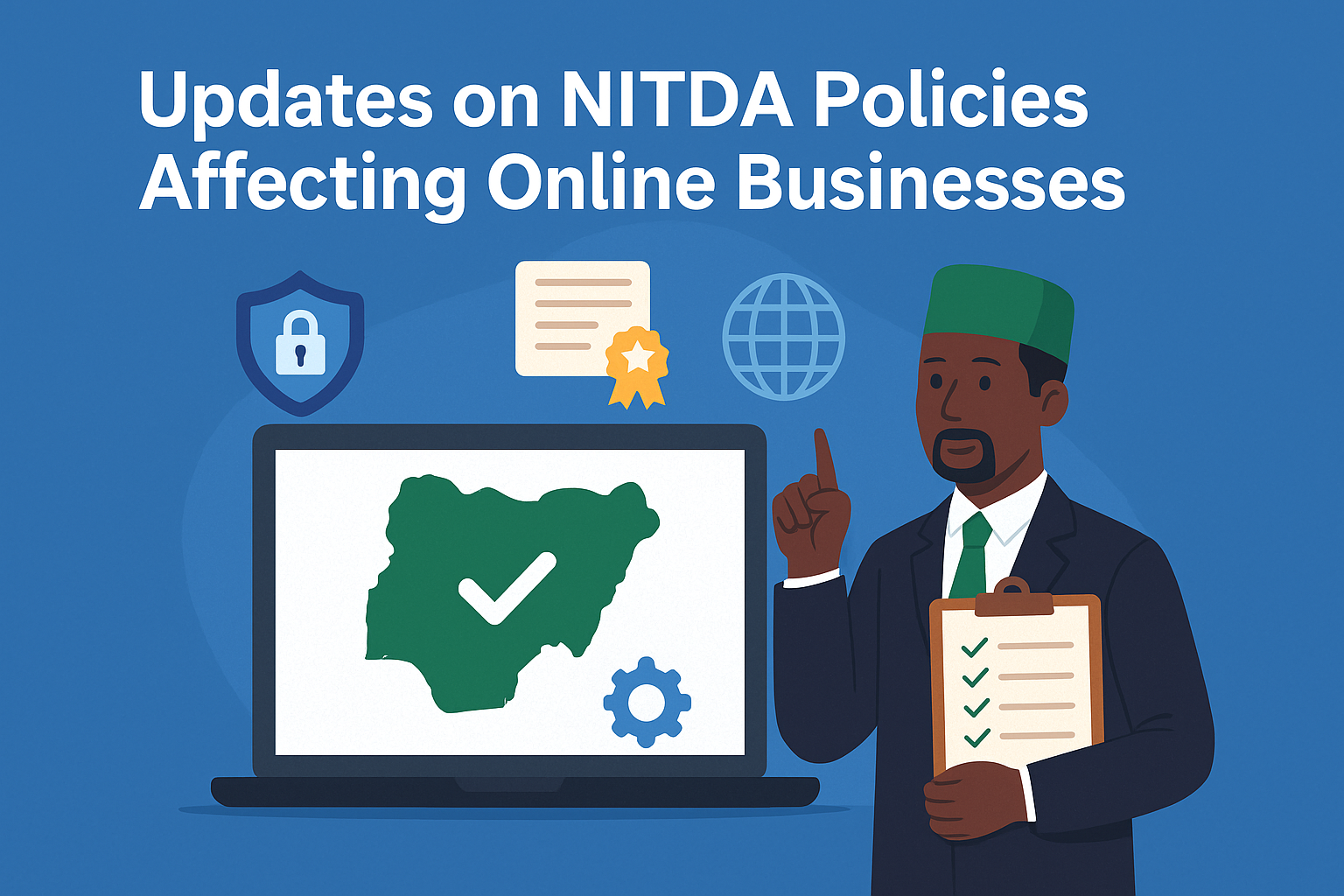Updates on NITDA Policies Affecting Online Businesses in Nigeria (2025)
As Nigeria’s digital economy continues to expand rapidly, the National Information Technology Development Agency (NITDA) remains central in shaping the policies that govern online activities. Whether you’re an e-commerce merchant, digital marketer, content creator, or SaaS provider, keeping up with NITDA’s regulatory framework is essential for compliance, security, and long-term business growth.
This article highlights the latest NITDA policies in 2025 and explains how they impact online businesses in Nigeria.
1. The Nigerian Data Protection Act (NDPA): Stronger Compliance Measures
What’s New:
With the enactment of the NDPA, NITDA is enforcing stricter data protection rules. Online businesses must now:
- Appoint a Data Protection Officer (DPO)
- Secure user consent before collecting personal data
- Conduct regular data protection audits
Impact on Online Businesses:
Non-compliance can lead to heavy fines, license suspension, or business shutdowns. Companies must now invest in:
- Data encryption & secure hosting
- Transparent privacy policies
- Internal data handling procedures
Read also: Why Employee Tech Training is a Game-Changer for Organisations
2. Mandatory Registration for Online Platforms
What’s New:
NITDA has made it compulsory for digital platforms—especially e-commerce, freelancing, and e-learning businesses—to register with the agency in line with national digital economy goals.
Impact on Online Businesses:
Startups and SMEs must now go through formal registration, which includes compliance with NITDA’s codes of conduct, security standards, and reporting requirements.
3. Local Hosting & Data Residency Rules
What’s New:
All platforms serving Nigerian users are required to host their data within Nigeria. This move aims to protect user information and minimise foreign surveillance risks.
Impact on Online Businesses:
Businesses using AWS, Google Cloud, or other foreign servers must now explore:
- Nigerian hosting providers
- Hybrid infrastructure setups
- Budget realignment for compliance
4. Digital Literacy & Employee Training
What’s New:
NITDA mandates digital literacy training for employees of companies that manage customer data or online transactions.
Impact on Online Businesses:
Staff must undergo regular training in:
- Cybersecurity
- Data privacy
- Ethical technology use
This ensures compliance during audits and builds organisational resilience.
Read also: Navigating the Landscape: Overcoming the Biggest Business Challenges in Nigeria
5. New Licensing Framework for Fintech & Digital Payments
What’s New:
In collaboration with the Central Bank of Nigeria (CBN), NITDA has introduced stricter licensing and security requirements for fintechs and payment platforms.
Impact on Online Businesses:
Payment platforms must now:
- Use licensed APIs
- Implement multi-layer encryption
- Conduct routine fraud detection & security testing
6. AI & Digital Content Regulation
What’s New:
As AI-generated content grows, NITDA is rolling out rules to tackle misinformation, deepfakes, and unethical AI use.
Impact on Online Businesses:
Content creators, marketers, and media houses must:
- Label AI-generated content
- Ensure transparency & ethical use of AI tools
7. Support Programs for Local Tech Startups
What’s New:
Despite stricter regulations, NITDA offers grants, incubation programs, and innovation hubs for startups that align with its vision of a digital-first economy.
Impact on Online Businesses:
Compliant businesses gain access to:
- Government-backed funding
- Visibility in local and global markets
- Partnership opportunities
Conclusion: Compliance as a Growth Strategy
The evolving NITDA regulatory landscape is designed not just to regulate but to empower Nigeria’s digital economy. While these policies may appear demanding, they create opportunities for:
- Responsible innovation
- Enhanced consumer trust
- Global partnerships
Online businesses that stay proactive in compliance will not only avoid penalties but also position themselves for sustainable growth.
Read also: Transforming Nigerian Businesses with Digital Tools In 2025
Key Action Points for Businesses:
- Audit and strengthen your data protection policies
- Appoint a DPO and ensure compliance with NDPA
- Register your digital platform with NITDA
- Host data locally or via approved providers
- Train staff regularly on digital best practices
- Use secure APIs for payment systems
- Stay informed about AI content policies
By aligning with these policies, Nigerian online businesses can remain compliant, competitive, and future-ready in the fast-evolving digital economy.





